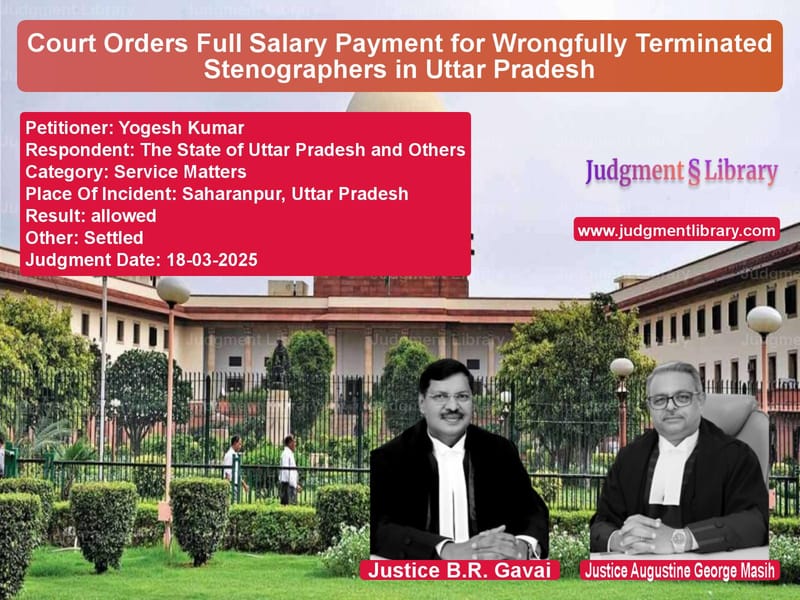Court Orders Full Salary Payment for Wrongfully Terminated Stenographers in Uttar Pradesh
In a significant legal development, the Supreme Court of India ruled in favor of Yogesh Kumar and similarly affected individuals, directing the State of Uttar Pradesh and the High Court of Judicature at Allahabad to pay their salaries for eight years of service. This landmark ruling brings relief to employees who were terminated due to administrative oversights despite having diligently served in their roles.
The court reaffirmed that employees cannot be denied their rightful dues due to bureaucratic errors and highlighted the responsibility of the government as a model litigant.
Background of the Case
The dispute dates back to an advertisement issued by the District Court of Saharanpur for the post of Stenographer. Responding to the call, the appellant, Yogesh Kumar, along with six others, applied and underwent the selection process. On April 16, 2002, they were appointed based on their merit.
However, it was later discovered that the advertised number of vacancies was only three, while seven candidates, including Yogesh Kumar, had been appointed. The oversight led to an internal review, and on February 28, 2005, the District Judge terminated the services of the four excess appointees.
Challenging their termination, the affected candidates approached the Allahabad High Court. The learned Single Judge dismissed their petition in 2012, upholding the termination. Subsequent appeals, including a Special Leave Petition (SLP) before the Supreme Court, also faced rejection. However, in its 2012 ruling, the Supreme Court granted them the liberty to seek unpaid salaries through an appropriate civil action.
Legal Battle for Unpaid Salaries
Petitioners’ Claims and Arguments
The petitioners made the following arguments before the Supreme Court:
- They had performed their duties as stenographers for eight years with full dedication and were entitled to salaries for that period.
- Their appointments were based on a process conducted by the authorities, and they should not be penalized for administrative mismanagement.
- The District Judge, upon realizing the excess appointments, should have accommodated them instead of terminating their services.
- Despite the Supreme Court’s 2012 judgment allowing them to pursue salary claims, the administration outright rejected their representations.
The petitioners’ counsel, Dr. L.S. Chaudhary, argued:
“The petitioners served with complete honesty and diligence for eight years. Denying their rightful salaries amounts to exploitation. The principle of natural justice demands that they be paid for the work they performed.”
Respondents’ Counterarguments
The State of Uttar Pradesh and the Allahabad High Court opposed the appeal, arguing:
- The termination was legally valid and had been upheld by multiple courts, including the Supreme Court.
- The petitioners failed to seek remedy through a civil court, as directed by the Supreme Court in its 2012 order.
- There was no statutory obligation to compensate individuals whose appointments were deemed irregular.
The respondents’ counsel, Shri Vishal Meghwal, stated:
“The termination was lawful. The Supreme Court in 2012 had clearly indicated that any salary claim must be pursued through civil action. The petitioners cannot sidestep this requirement by directly approaching the court now.”
Supreme Court’s Observations and Final Judgment
The Supreme Court, comprising Justices B.R. Gavai and Augustine George Masih, ruled in favor of the petitioners. The bench criticized the authorities for taking a hyper-technical approach instead of ensuring fair treatment to the petitioners.
The Court remarked:
“The appellants performed their duties diligently for eight years. Their termination was not due to any misconduct on their part but was a result of an administrative lapse. It would be unjust to deprive them of their rightful salaries.”
The bench also referred to the landmark ruling in ABL International Ltd. v. Export Credit Guarantee Corporation of India, emphasizing that courts must prioritize justice over rigid technicalities:
“When fundamental rights and livelihood issues are at stake, the judiciary must take a pragmatic approach rather than adhering to hyper-technical interpretations of the law.”
Revised Compensation and Court Directives
The Supreme Court issued the following directives:
- Payment of Salaries: The respondents were directed to pay full salaries to the petitioners for the entire eight-year period.
- Interest on Unpaid Salaries: A 6% per annum interest rate was imposed, calculated from the date salaries were originally due.
- Compensation for Litigation Hardships: An additional sum of Rs. 1 lakh was awarded to each petitioner for the undue hardship caused by prolonged litigation.
- Deadline for Compliance: The respondents were given a strict timeline of three months to process and disburse the payments.
Final Observations
The Court emphasized that government bodies and judicial institutions must act as model litigants, ensuring that employees are treated fairly. The ruling reaffirmed that employees cannot be denied fair wages due to bureaucratic oversights.
Petitioner Name: Yogesh Kumar.Respondent Name: The State of Uttar Pradesh and Others.Judgment By: Justice B.R. Gavai, Justice Augustine George Masih.Place Of Incident: Saharanpur, Uttar Pradesh.Judgment Date: 18-03-2025.
Don’t miss out on the full details! Download the complete judgment in PDF format below and gain valuable insights instantly!
Download Judgment: yogesh-kumar-vs-the-state-of-uttar-p-supreme-court-of-india-judgment-dated-18-03-2025.pdf
Directly Download Judgment: Directly download this Judgment
See all petitions in Employment Disputes
See all petitions in Public Sector Employees
See all petitions in Termination Cases
See all petitions in Judgment by B R Gavai
See all petitions in Judgment by Augustine George Masih
See all petitions in allowed
See all petitions in settled
See all petitions in supreme court of India judgments March 2025
See all petitions in 2025 judgments
See all posts in Service Matters Category
See all allowed petitions in Service Matters Category
See all Dismissed petitions in Service Matters Category
See all partially allowed petitions in Service Matters Category







